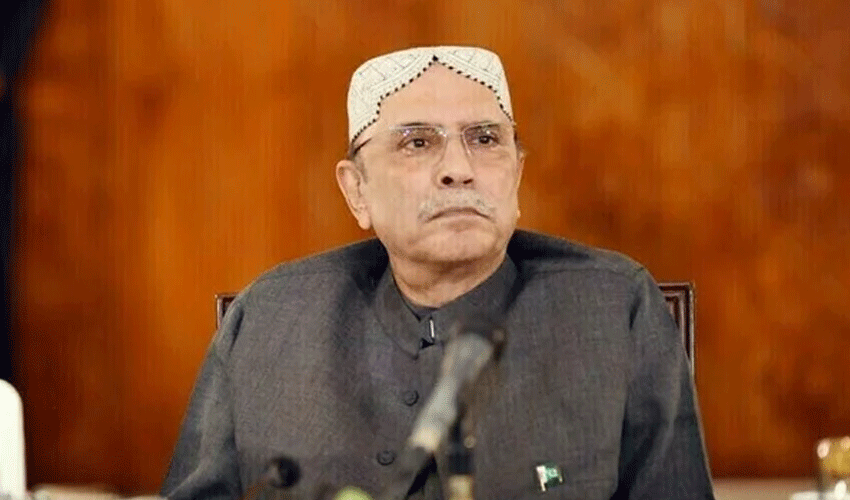Finance Minister Muhammad Aurangzeb announced on Saturday that Pakistan plans to send a high-level delegation to Washington to reinforce its commitment to a long-term strategic partnership with the United States, especially in light of shifting US trade policies under President Donald Trump’s administration.
Speaking at a press conference, Aurangzeb said the government is in the final stages of formulating its recommendations, which will soon be presented to the prime minister for approval. Once approved, a delegation will travel to Washington to present Pakistan’s perspective and emphasize its intent to build a sustainable strategic relationship.
“In the next couple of days, we are going to finalize our recommendations to the prime minister, and... with approval of PM, we intend to send a high-level delegation to Washington to get our views across and to ensure that we want to be a partner, which is a long-term strategic partner,” Aurangzeb stated.
To navigate the emerging trade dynamics, the government has established two committees: a steering group led by the finance minister and a working group headed by the secretary of commerce. These groups have been actively meeting to assess the situation and explore ways to convert potential challenges into opportunities.
“You should never let a good crisis go to waste. We are looking it both challenge as well as opportunity,” Aurangzeb remarked, highlighting the government’s proactive approach. He noted that a policy package is under development and will be presented to the US administration once finalized.
The finance minister stressed the importance of a mutually beneficial, long-term economic relationship with the US, which remains Pakistan’s largest export destination.
Economic stability and growth strategy
Aurangzeb also addressed the country’s broader economic situation, expressing confidence in Pakistan’s macroeconomic outlook. He emphasized that stability has been achieved, particularly in terms of foreign exchange reserves, exports, and inflation control. “It’s about basic hygiene. Any economy has to have these elements before it goes forward.”
He revealed that Pakistan’s foreign exchange reserves have risen significantly, supported by a 32% year-on-year increase in remittances over the first two months of the current fiscal year. Exports are also growing at a steady 7%, and the government anticipates reserves to surpass $13 billion by the end of June.
On the domestic front, inflation has dropped to 0.7% -- the lowest rate in six decades. “We are moving in the right direction in terms of headline and the core inflation as well,” he added.
Additionally, the decline in the mark-up rate has brought down the KIBOR (Karachi Interbank Offered Rate), providing relief for industries and boosting investor confidence. Aurangzeb cited improved sentiment across businesses, investors, and consumers, supported by various market indicators.
Structural reforms underway
The finance minister detailed the government’s ongoing structural reform agenda, particularly in the areas of taxation, energy, and privatization. He revealed that 24 state-owned enterprises have been transferred to the Privatization Commission and that the re-launch of Pakistan International Airlines (PIA) is expected this month.
Public development spending has also increased significantly, reaching Rs870 billion compared to Rs720 billion last year -- an indication of growing economic activity.
Aurangzeb reiterated the government’s emphasis on export-led growth, urging all sectors to contribute to export performance. He mentioned that even the automobile industry has begun exporting products.
IMF program and fiscal targets
The minister confirmed that Pakistan has successfully concluded the six-monthly review under its current agreement with the International Monetary Fund (IMF), paving the way for the release of a $1 billion tranche. He called the approval of agricultural income tax through provincial assemblies a historic milestone and noted that discussions are ongoing regarding the IMF’s Resilience and Sustainability Fund.
He expressed hope that the current IMF program could be the last, provided that difficult but necessary policy choices continue to be made.
In terms of revenue, Aurangzeb said the country is on track to achieve a 10.6% tax-to-GDP ratio by June, up from 8.8% in the last fiscal year. The goal is to gradually reach 13.5%. This year’s revenue target is projected to be 32.5% higher than the previous year. The tax base is expanding, with the number of tax filers doubling from two million to four million by October 31, while total returns filed have exceeded six million.
Reforms in digital enforcement -- particularly in customs -- have led to a 16% revenue increase. The government’s Track and Trace system has been implemented in key sectors such as fertilizer, sugar, and tobacco, with others like cement, beverages, and cotton soon to follow.
Filing returns is also being simplified through technological upgrades, making it easier for salaried individuals to file taxes without needing professional assistance.
Energy sector and institutional reforms
Aurangzeb highlighted that one-third of industrial electricity tariffs have been reduced -- a move acknowledged and appreciated by industry stakeholders. Additionally, reforms are underway in entities like NTDC and DISCOs to improve financial sustainability.
On institutional reform, the minister noted that the government is gradually restructuring and right-sizing ministries and their attached departments. The first two phases of this initiative have been approved, with the next two slated for cabinet review and a fifth phase currently in the pipeline. The complete analysis of these reforms is expected by June, and will inform the upcoming federal budget.
Debt management
Pakistan’s debt maturity profile has been extended to 3.5 years, which, according to the minister, will help save approximately Rs 1 trillion in debt servicing costs.


























